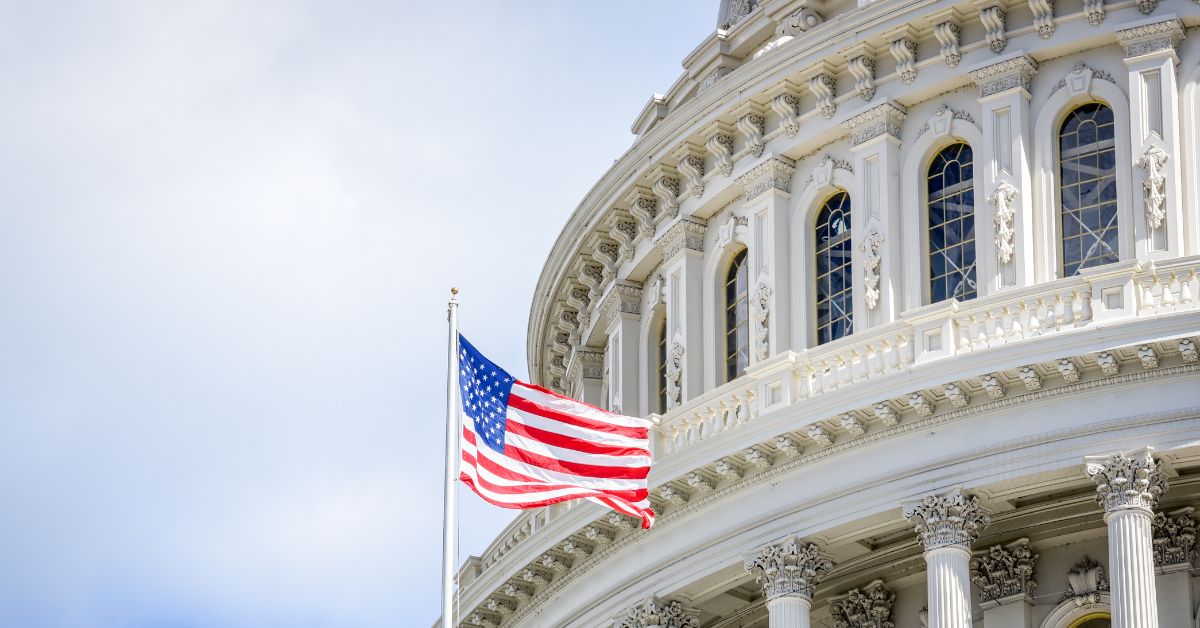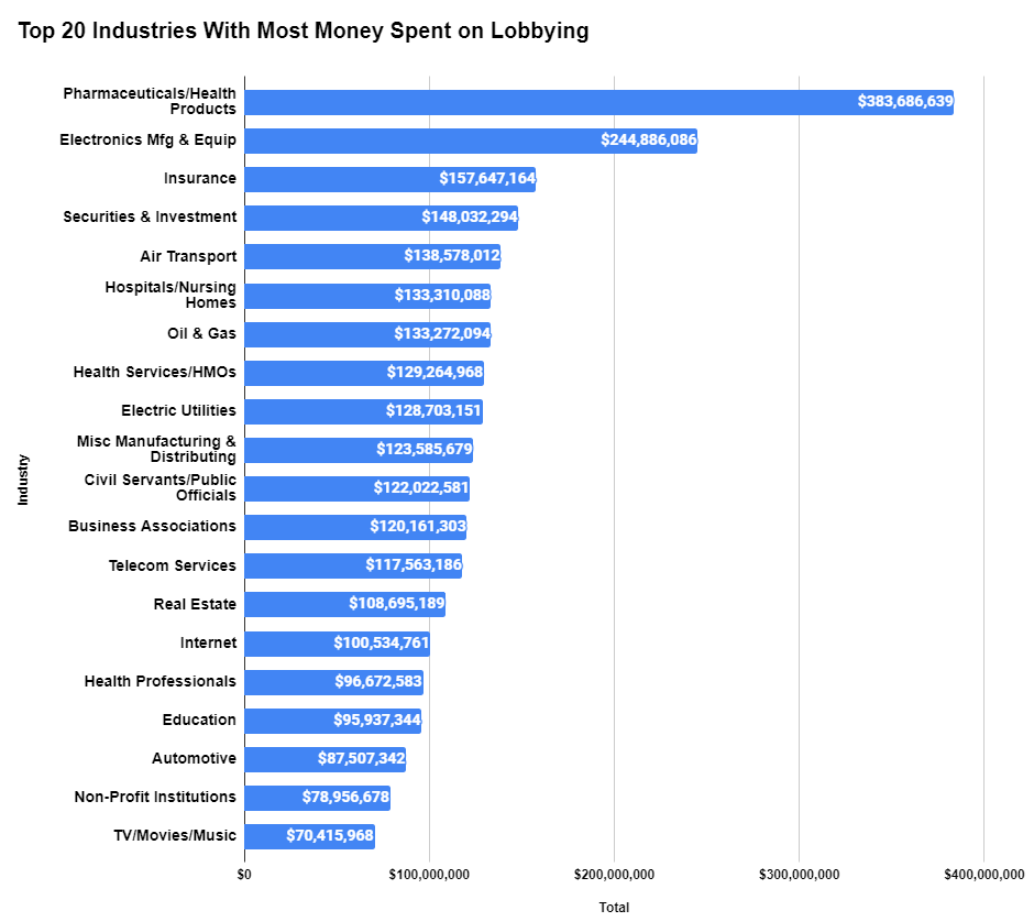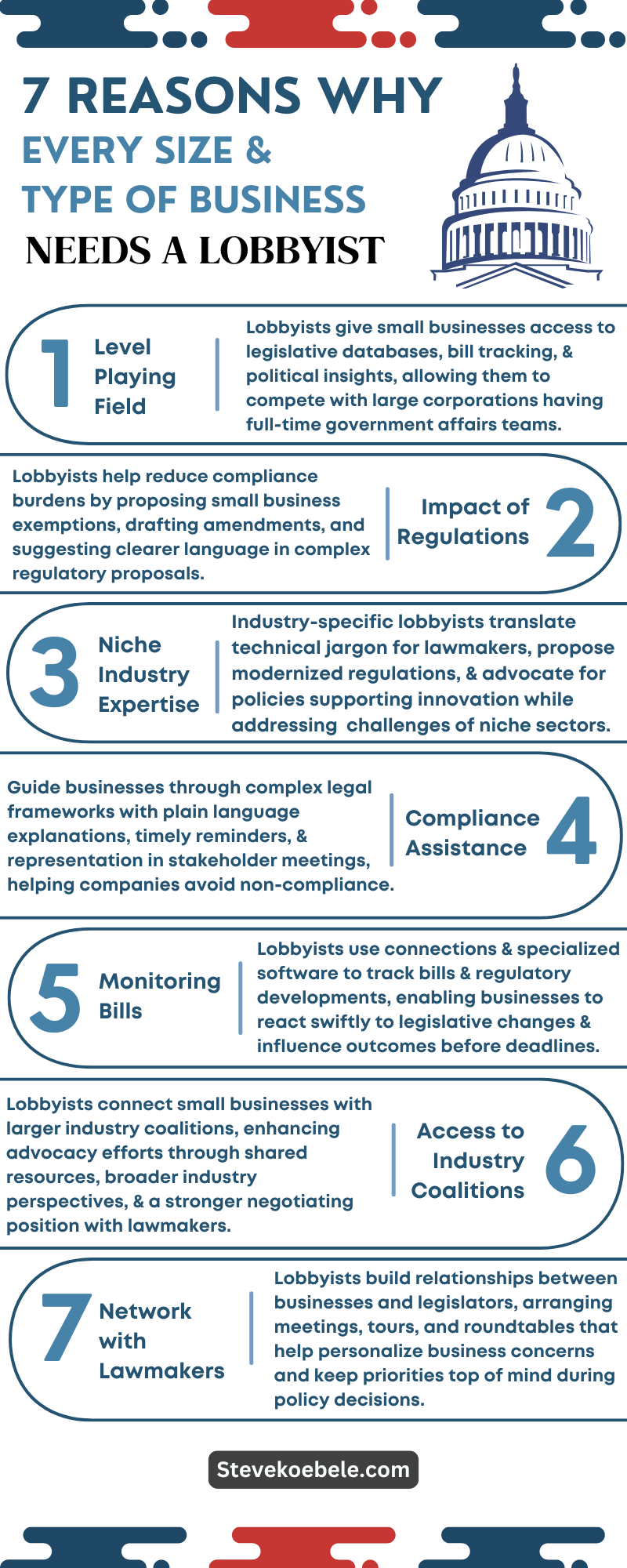
More than 4,500 bills were passed by the House and Senate of the Texas state legislature in 2023 alone, demonstrating the active public policy landscape companies must navigate in the Lone Star state. As policymaking in Austin directly impacts various industries, Texas lobbying firms can provide valuable services to diverse business sectors.
Every type of business can benefit from good lobbying because legislation affects every organization, whether big or small. Here are the top 20 spenders on lobbying in the US from 2023 to give you an idea of how diverse the client base of lobbying firms is:
Industry | Total |
Pharmaceuticals/Health Products | $383,686,639.00 |
Electronics Mfg & Equip | $244,886,086.00 |
Insurance | $157,647,164.00 |
Securities & Investment | $148,032,294.00 |
Air Transport | $138,578,012.00 |
Hospitals/Nursing Homes | $133,310,088.00 |
Oil & Gas | $133,272,094.00 |
Health Services/HMOs | $129,264,968.00 |
Electric Utilities | $128,703,151.00 |
Misc Manufacturing & Distributing | $123,585,679.00 |
Civil Servants/Public Officials | $122,022,581.00 |
Business Associations | $120,161,303.00 |
Telecom Services | $117,563,186.00 |
Real Estate | $108,695,189.00 |
Internet | $100,534,761.00 |
Health Professionals | $96,672,583.00 |
Education | $95,937,344.00 |
Automotive | $87,507,342.00 |
Non-Profit Institutions | $78,956,678.00 |
TV/Movies/Music | $70,415,968.00 |
Pharma and health have been the biggest spenders, followed by electronics, insurance, investment, etc. This clearly shows that no matter which business organization you belong to, a lobbyist can help you if legislation can affect you. Here's the visual representation of how much money is spent by just 20 industries out of 100s in 2023 alone:

No matter which industry you belong to or the size of your business, you can use the help of Texas lobbying firms to achieve several benefits. Here are 7 reasons why:

Large corporations wield significant influence in Texas politics. They employ full-time government affairs teams to track bills, analyze regulations, and build relationships with lawmakers. Small businesses often lack these resources, putting them at a competitive disadvantage.
Lobbyists level the playing field for smaller companies. They provide:
With a lobbyist, small businesses gain advocacy power like large corporations. They stay informed about proposed laws affecting their industry. This knowledge allows them to respond quickly to threats or opportunities.
Corporate Resources | Lobbyist Equivalents |
Dedicated government affairs team | Experienced lobbyist |
In-house bill tracking | Legislative database access |
Full-time relationship building | Established lawmaker connections |
Lobbyists also help small businesses build crucial relationships. They introduce company leaders to key lawmakers and staff. These connections prove invaluable when issues arise needing legislative attention.
Regulations significantly impact businesses of all sizes. However, small companies often struggle more with compliance costs. A seasoned lobbyist can help mitigate these challenges. A great lobbyist monitors rule proposals in the Texas Register and can successfully craft comments prior to rule adoption.
Lobbyists with legislative and regulatory drafting experience offer several benefits:
Great lobbyists analyze complex legal language and identify problems others might miss. This expertise allows them to craft targeted changes that protect small business interests.
Regulatory Challenge | Lobbyist Solution |
High compliance costs | Propose small business exemptions |
Unclear definitions | Suggest clearer language |
Unrealistic thresholds | Advocate for tiered requirements |
For example, a proposed environmental regulation might require expensive new equipment. A qualified lobbyist could push for a phase-in period or financial assistance for small firms. This approach balances environmental goals with economic realities.
Lobbyists also help businesses anticipate future regulatory trends. They monitor policy discussions and provide early warnings about potential changes. This foresight allows companies to adapt proactively rather than scrambling to comply later.
Lobbyists specializing in specific industries offer unique benefits. They understand complex technologies, materials, and processes, which helps them to effectively explain technical issues to lawmakers.
Key advantages of industry-specific lobbyists include:
These lobbyist experts advocate for policies supporting innovation. They balance progress with small company needs. Their input shapes laws that work for businesses of all sizes.
Industry Challenge | Lobbyist Contribution |
Complex technical issues | Clear explanations for lawmakers |
Outdated regulations | Proposals for modernization |
Innovation barriers | Advocacy for flexible policies |
For example, a tech industry lobbyist might explain blockchain to legislators. They'd highlight its potential while addressing security and energy consumption concerns. This balanced approach helps create fair, effective regulations.
Many businesses find dealing with complicated laws challenging. Lobbyists offer valuable support in this area. They interpret new statutes, administrative agency rules, and agency guidance for clients.
Lobbyists assist with compliance by:
This guidance helps companies avoid costly mistakes. It ensures they meet legal requirements without unnecessary burdens.
Compliance Need | Lobbyist Support |
Understanding new regulations | Plain language explanations |
Meeting reporting deadlines | Timely reminders and guidance |
Influencing future rules | Stakeholder representation |
Lobbyists also help shape future regulations. They participate in stakeholder meetings and provide feedback. This input ensures small business perspectives influence new rules.
Effective lobbying requires staying informed about new bills. Lobbyists use various methods to monitor legislative activities, including personal connections and technology tools.
Key bill monitoring strategies include:
These approaches ensure lobbyists catch relevant bills early. They can then review and respond before critical deadlines pass.
Monitoring Method | Benefit |
Capitol connections | Proactive information gathering |
Automated tracking tools | Comprehensive, real-time updates |
API-based alerts | Customized, industry-specific monitoring |
For instance, a healthcare lobbyist might track bills mentioning "telemedicine." They'd receive alerts about new introductions or amendments, allowing for swift analysis and response.
Timely awareness lets businesses shape legislation early, preventing surprises that could harm their interests. With a great lobbyist, companies stay ahead of regulatory changes.
Most trade groups in Texas employ full-time lobbyists. These associations wield significant influence in Austin, and small businesses often struggle with the cost and steps needed to join these efforts alone.
A skilled lobbyist bridges this gap. They help smaller companies participate in broader coalition activities. This inclusion amplifies the voice of individual businesses.
Benefits of coalition access include:
United advocacy strengthens an entire industry's message. It carries more weight than solo efforts, and lawmakers pay attention when diverse businesses speak as one.
Solo Advocacy | Coalition Advocacy |
Limited resources | Pooled expertise and funds |
Narrow focus | Broader industry perspective |
Less political clout | Increased influence |
For example, a small tech startup might struggle alone. A qualified lobbyist would seek to include the tech firm in a cybersecurity coalition, and suddenly, their concerns become part of a larger push.
Coalitions also offer valuable networking opportunities. Small businesses meet industry leaders, and these connections can lead to partnerships or mentorship. A good lobbyist facilitates these introductions.
Networking with lawmakers is vital for business success. Lobbyists excel at facilitating these connections and introducing clients to key decision-makers in the Texas Capitol and administrative agencies.
Ways lobbyists foster lawmaker relationships:
These connections humanize business issues for lawmakers. They see real faces behind policy debates, and this personal touch can properly sway decisions.
Benefit for Businesses | Benefit for Lawmakers |
Early access to opportunities | Real-world industry insights |
Increased name recognition | Broader constituent understanding |
Priorities stay top-of-mind | Informed policy decisions |
Building rapport yields long-term advantages. When funding or incentives arise, networked businesses hear first. Their concerns receive priority attention during deliberations and debates.
For instance, a small manufacturer might meet with their state Senator. They might discuss workforce challenges. Later, when considering job training bills, that Senator will likely recall the conversation.
Regular interaction builds name recognition. Lawmakers remember companies they've met. This awareness can influence future policy discussions. A skilled lobbyist nurtures these relationships over time.
Businesses often question the value of lobbying. The numbers tell a compelling story. Top companies see massive returns on their lobbying expenses.
Key facts about lobbying ROI:
This extraordinary ROI makes lobbying a crucial business strategy. Few investments offer such dramatic returns, and even small businesses can benefit significantly.
Lobbying Spend | Average Return |
$1,000 | $760,000 |
$10,000 | $7,600,000 |
$100,000 | $76,000,000 |
These figures represent averages across top companies. Results may differ for smaller firms. However, the potential remains substantial.
Federal support can take many forms, including favorable regulations or grants. Tax savings directly boost a company's bottom line.
For example, a tech startup might spend $50,000 on lobbying. This could lead to a $1 million research grant. The ROI would exceed even the average.
Lobbying's impact extends beyond direct financial returns. It can shape industry landscapes, and companies gain competitive advantages through public policy influence.
Critics argue that this high ROI signals systemic issues and questions the fairness of such influence. Regardless, it remains a powerful tool for businesses.
Small businesses shouldn't dismiss lobbying as only for big players. Even modest efforts can yield significant results. A skilled lobbyist maximizes returns for clients of all sizes.
With so much activity in the Texas state legislature each session, relying on skilled lobbying professionals is vital for every Texas business.
Steve Koebele is well-versed in navigating the legislative process and executive branch activity. A very well qualified lobbyist can help turn the tides of public policy outcomes in your favor.